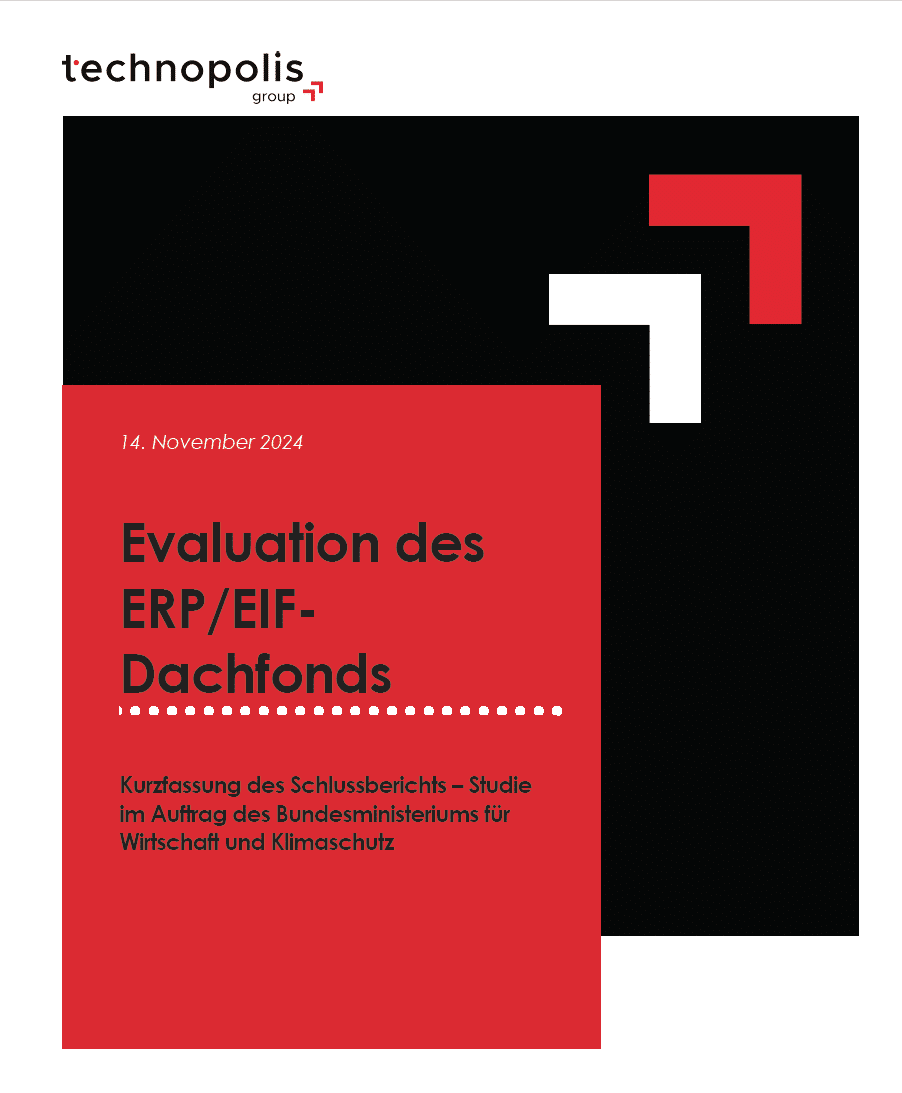Evaluation des ERP/EIF- Dachfonds – Kurzfassung des Schlussberichts – Studie im Auftrag des Bundesministeriums für Wirtschaft und Klimaschutz
Publication date: 19 February 2025 | Report language: DE
The ERP/EIF fund of funds, which was initiated in 2003 together with the European Investment Fund (EIF), is a central element of the German governments’ promotion of the venture capital market. From 2003 to 2023, the fund of funds invested in more than 130 venture capital funds. In total, the German Federal Ministry for Economic Affairs and Climate Action (BMWK) provided more than EUR 2.3 billion from the ERP Special Fund for venture capital funds with a focus on technology companies.
With the fund of funds, the Federal Government is pursuing the goal of strengthening the German venture capital market in the long term, creating an incentive to raise additional funds from private sector investors and supporting the expansion of the equity base of high-tech SMEs in Germany.
The BMWK commissioned Technopolis Group to implement the first evaluation of the ERP/EIF fund of funds. In addition to the Technopolis evaluation team, a scientific sounding board consisting of Prof. Dr. Tereza Tykvová (University of St. Gallen) and Prof. Dr. Reiner Braun (Technical University of Munich) was appointed.
The evaluation examined the medium to long-term effects of the ERP/EIF fund of funds on the supply of equity capital for technology-oriented SMEs on the German venture capital market and made recommendations for the continuation and development of the instrument. Within the evaluation’s analysis the team carried out a comprehensive interview program and a comparative group analysis, among others.
The results show that the ERP/EIF fund of funds has established itself as an important player in the German VC market over the last 20 years and has made a significant contribution to the total investment volume. The ERP/EIF fund of funds plays an important role in the German financing landscape for both initial and follow-up financing. As the largest single market participant, the ERP/EIF fund of funds in Germany acts as a stabilizer in a crisis-prone market.
The positive effects of the ERP/EIF fund of funds are particularly strong for newly established fund management teams. This is where the EIF’s role as an anchor investor and the associated “seal of approval” have a greater impact. The fund of funds is regularly part of the first closing of an investment fund and thus increases the probability of success of the fundraising. However, investments in newly established fund management teams (first-time funds) often fail due to the high requirements for references (track record), due diligence and minimum capital resources, which is why fundraising often only begins in the second or even later fund generation.
In general, the ERP/EIF fund of funds has advantages over other types of financing support instruments. In particular, it can draw on the management expertise of the EIF, has good scalability and can provide targeted and rapid support for fund managers and start-ups.
Recommendations for action
- The quality seal function of the ERP/EIF fund of funds to private investors is strengthened if an investment commitment is made particularly early, ideally before the first closing of an investment fund. This allows funds to complete their fundraising more quickly and portfolio companies receive their investments earlier. Thus, the role of the fund of funds as an early anchor investor should be further strengthened in the future.
- The evaluation has shown that the marginal seal of approval effect tends to decrease for more experienced GPs that have already launched more than one fund generation. In future, there should be a higher emphasis on supporting GPs only for the first fund generations. A cap on participation in successor funds could avoid negative market signals in case the fund of funds ceases investing in a GP’s future funds.
- Apart from the EIF, there are hardly any comparable institutional investors in Europe that can make similarly high investments. To strengthen the European venture capital market, the EIF should act as a “European fund of funds” and thus attract larger, private institutional investors and, as a result, possibly also achieve a higher level of matching in the investments of the ERP/EIF fund of funds.
The ERP/EIF fund of funds invests primarily in ICT and life sciences/biotech companies. Instead of amplifying existing market characteristics, it could be made more flexible in the future to address funding policy priorities in other sectors and financing phases. The fund of funds could thus make greater use of its market power and set its own priorities.







